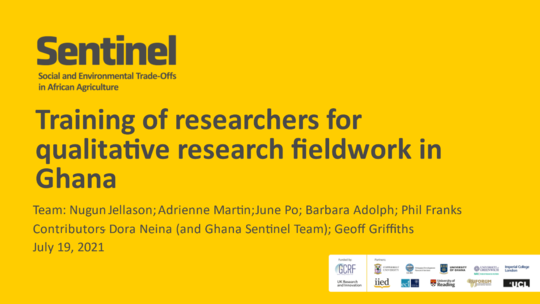Sentinel qualitative research commences in Ghana through online training
Sentinel team members deliver online training to consultants in Ghana. Credit: Nugun Jellason/Sentinel CC BY 4.0
In May this year, the qualitative research to examine the Sentinel project’s key research questions kicked off across the three project countries of Ethiopia, Ghana and Zambia. However logistical delays put the research in Ghana on hold.
Yet, on 19 July 2021, the Ghana training officially started online with a team of eight research consultants led by researchers from the University of Ghana’s Institute of Statistical, Social and Economic Research (ISSER) to carry out work in two sites: in Dompim in the Western and Walembelle in the Upper West regions respectively. The team was divided into two, comprising four researchers per team. They worked in different sites according to language requirements and it was agreed that each site would share lessons with the other.
Getting this qualitative research underway marks an important milestone in the life of the Sentinel project, with the project end of March 2022 now fast approaching. The research aims to explore and get further insights into issues previously found during the reconnaissance and quantitative household surveys conducted in 2019 and 2020, and to help better address the key research questions on drivers and impacts of agricultural expansion. The research will also seek ways to manage trade-offs between agricultural production and biodiversity conservation.
Capacity building is one of the main objectives of the Sentinel project, and the training offered an opportunity to share knowledge in vertical and horizontal ways as the UK researchers shared experiences with the research consultants in Ghana on the application of participatory techniques such as Transect Walks, Focus Group Discussions, Key Informant Interviews, Wealth Ranking, Scoring and Visualisation. The Sentinel staff also learned a lot from the experiences of the consultants. While some of the researchers had previously used some of these techniques, they acknowledged that some of the approaches were new to them, and they found the training useful and an opportunity to learn new research methods to progress their careers.
The remote training was part of the strategy deployed by the Sentinel project to adapt to the research travel limitations imposed by the COVID-19 pandemic and to fulfil its research mandate.
